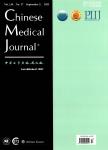New insights into the immunopathogenesis of systemic lupus erythematosus: the role of T follicular helper cells
New insights into the immunopathogenesis of systemic lupus erythematosus: the role of T follicular helper cells作者机构:Department of Hematology Xuanwu Hospital Capital MedicalUniversity Beijing 100053 China
出 版 物:《Chinese Medical Journal》 (中华医学杂志(英文版))
年 卷 期:2014年第127卷第19期
页 面:3496-3502页
核心收录:
学科分类:0710[理学-生物学] 07[理学] 08[工学] 09[农学] 071007[理学-遗传学] 0901[农学-作物学] 0836[工学-生物工程] 0902[农学-园艺学] 090201[农学-果树学] 090102[农学-作物遗传育种]
主 题:systemic lupus erythematosus T follicular helper cells dendritic cells autoantibodies
摘 要:Objective To review the development of T follicular helper (TFH) cells and their role in systemic lupus erythematosus (SLE) pathogenesis, the effect of dendritic cells (DCs) on TFH cells in SLE, as well as the potential use of TFH cells as a new therapeutic target in clinical practice. Data sources The data used in this review were retrieved mainly from the PubMed database (1989-2013). The terms used in the literature search were "T follicular helper cells," "systemic lupus erythematosus," and "dendritic cells." Study selection Relevant publications about the TFH cells development, the interaction between the TFH cells and the DCs, and the clinical applications of TFH cells were identified, retrieved, and reviewed. Results TFH cells, a novel distinct CD4+ T cell subset, are specialized in providing help to B cells in the formation of germinal centers (GCs) and long-term protective humoral immune responses. The development of TFH cells from naive CD4+ T cell is a multistep process. As the pivot of immunoregulation, DCs are indispensable for TFH cells generation. In addition to receptor-ligand interactions between TFH cells and DCs, the cytokines secreted by DCs are also necessary for TFH cell generation. TFH cell dysregulation has been implicated in the development of SLE. More evidence from animal models of SLE and SLE patients suggests that TFH cells are necessary for pathogenic autoantibody production. Therefore, therapeutically targeting TFH cells can be a promising approach to treat antibody-mediated autoimmune diseases including SLE. Conclusion TFH cells play a critical role in the pathogenesis of SLE, making them attractive therapeutic targets in clinical practice.



